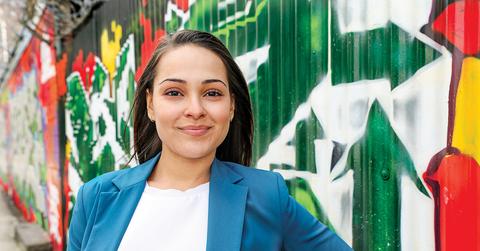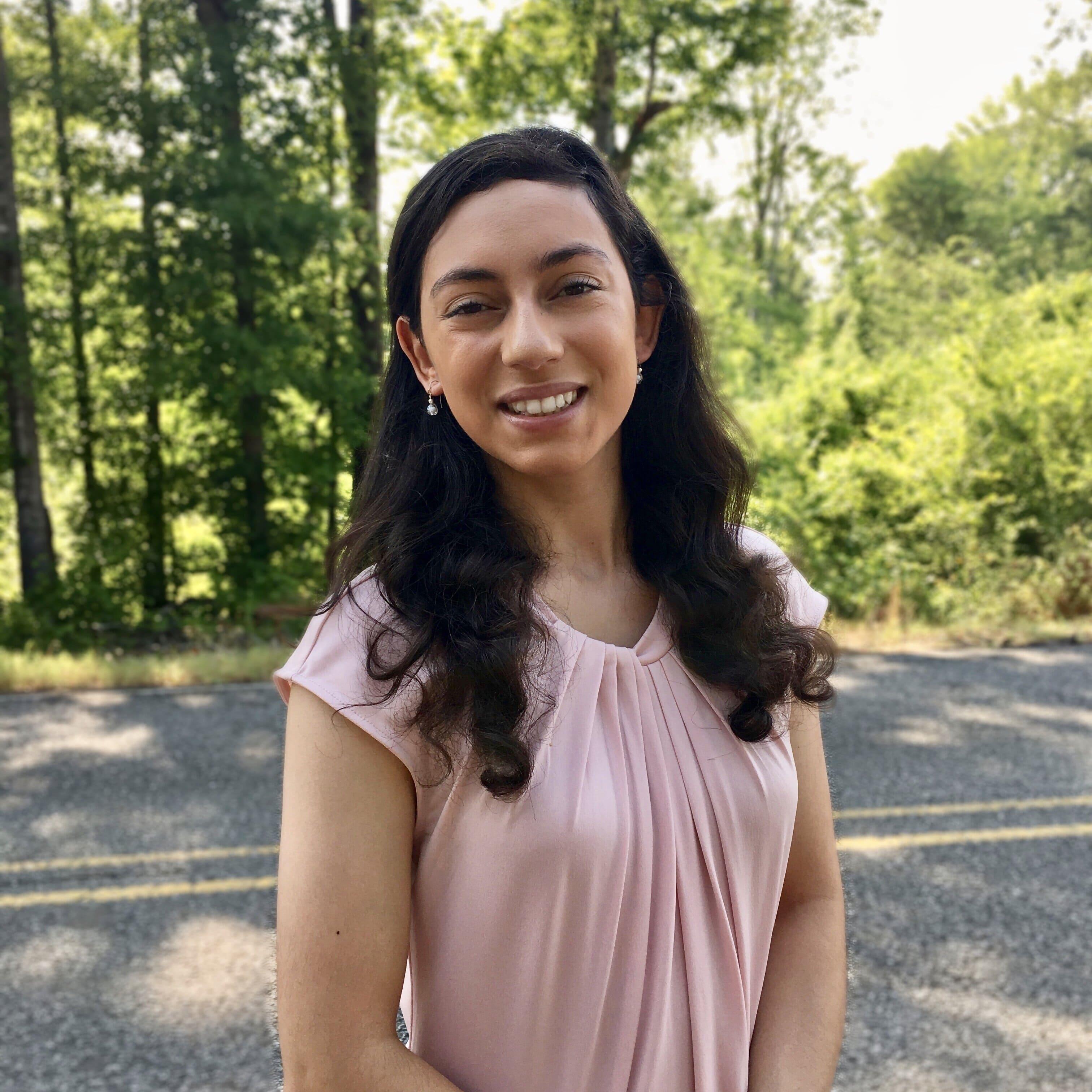Yanely Espinal, also known as MissBeHelpful, is a financial educator and content creator with a mission to help young people learn about personal finance. Born in Brooklyn, New York, Yanely was one of the first in her family to graduate college but quickly learned as a full-time teacher that with a master’s degree from an elite university, she still didn’t know how to manage her finances responsibly.
After getting out of debt and building an 820 credit score, she decided to create her YouTube channel, MissBeHelpful, and share her wealth-building journey with others who never learned how to budget, manage their credit or invest in their retirement.
She now serves as the director of educational outreach at Next Gen Personal Finance and has delivered keynote speeches around the country at events like CNBC’s Youth Virtual Summit and Brown University’s “Life After Brown” Conference.
Her Agenda spoke with Yanely about her newest book, Mind Your Money, and how money newbies can learn about finances in a way that motivates them to live out their goals.
[Editor’s note: This article was originally published on JUL, 24 2023. We are re-publishing this in honor of Financial Literacy Month.]
Her Agenda: How did you get to this point in your financial journey to be so financially savvy?
Yanely Espinal: It took many, many years. It was definitely not an overnight change. I first started to recognize that I had to prioritize my personal finances and actually make a budget, track my spending, and set goals for my money around 2013 when I was teaching at a Brooklyn elementary school. I would get my paycheck and pay for all of my responsibilities for the month— my rent, bills, cell phone, groceries, and whatever minimums I owed on my credit cards. And I wouldn’t have any money left over. I got really frustrated because I felt like it didn’t make sense. I watched my parents struggle, I grew up in poverty, and here I was with two college degrees, working a full-time job as a professional making an over-the-average income. And still, my money wasn’t working for me.
That’s when I started teaching myself about personal finance by reading books. I’ve read dozens of books about money management, personal finance, investing in the stock market, personal development, changing your mindset, and the psychology of money. I became obsessed with the topic because I felt like nobody had ever taught me this in school. I didn’t know anybody who was talking about this. I began to study money the same way you might study math or French. Using blogs, podcasts, articles, and videos on YouTube, I created a plan for myself, got out of debt, and started budgeting really carefully every month and paying attention to the amount of money that I would spend on unnecessary purchases, like shopping and dinners. I was able to save and invest money so I could actually start creating wealth.
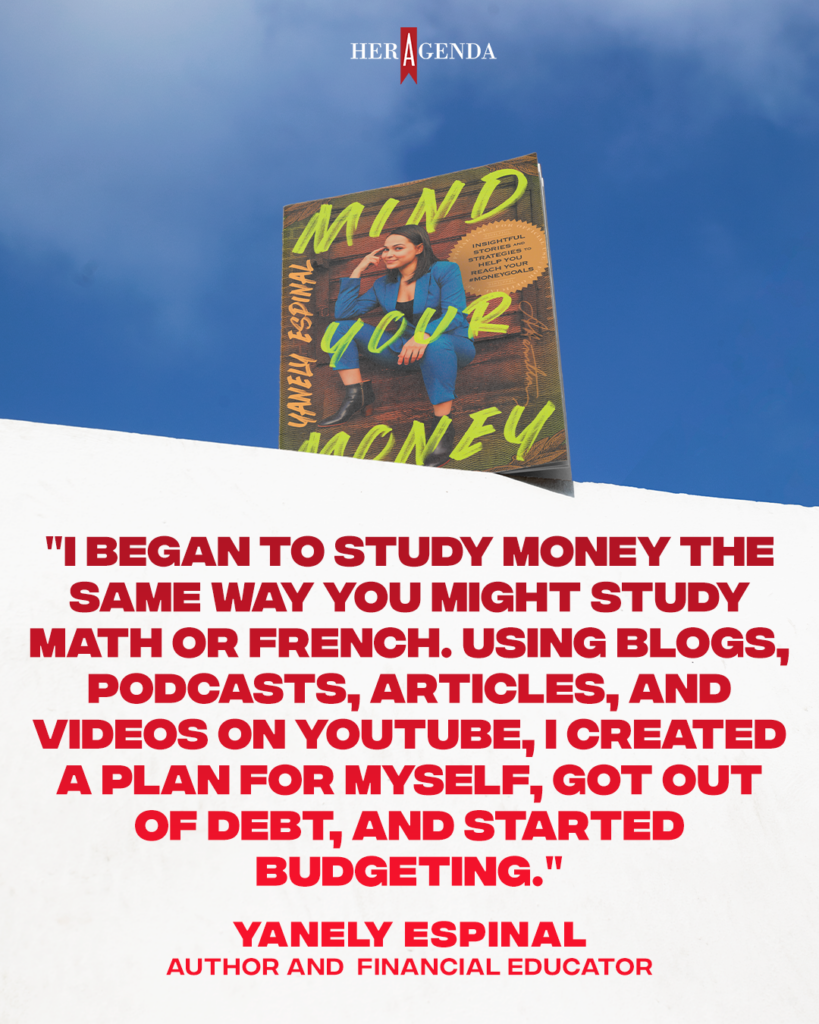
Her Agenda: Your YouTube channel has a lot of information about credit scores, stocks, and more. What gave you the inspiration to start?
Yanely Espinal: I actually started my channel at a time when I was at a low point. In my career, I finished [my job] as a teacher. After I finished the school year, I decided not to come back for the next year because I was so exhausted after working from five in the morning to six at night. Usually, when people work those kinds of hours, they’re paid so much. Wall Street investment bankers work around 6 am until 10 pm, but they’re paid around $500,000 a year. I was working those crazy hours, but I was only making $40,000 a year. I didn’t want to keep teaching like that, so I took a job at a tutoring center after school where I had to learn the business side of it— recruiting students, collecting tuition, marketing the center, and having meetings with potential clients who would walk in the door. That really interested me and got me intrigued about running my own business.
After about a year, I lost interest in it because it felt too robotic. I was doing the same thing every day and needed something that was going to give me a challenge. I didn’t want to leave the company because I was just only there for one year, so I started creating YouTube videos in the summer of 2015. In my first video, I explained how I had just finished paying off my credit cards. I spoke at a beginner’s level, in a way that I wished somebody would have explained it to me when I was learning, with real talk. Those videos naturally started getting a lot of views organically, and my subscriber count increased.
That’s when I realized that there are two problems. The first one is that the financial content that does exist out there is really boring, and the people that explain it do it in a way that’s highly complicated. The second problem is that people don’t know where to go when they have questions about money, because it’s such a taboo topic. This is a real problem, because if they go ask somebody, usually it’s going to be someone who’s trying to sell them a product, service, or course. My channel was truly educational and about things I care about. I think that that was probably refreshing for a lot of people who just wanted to learn.
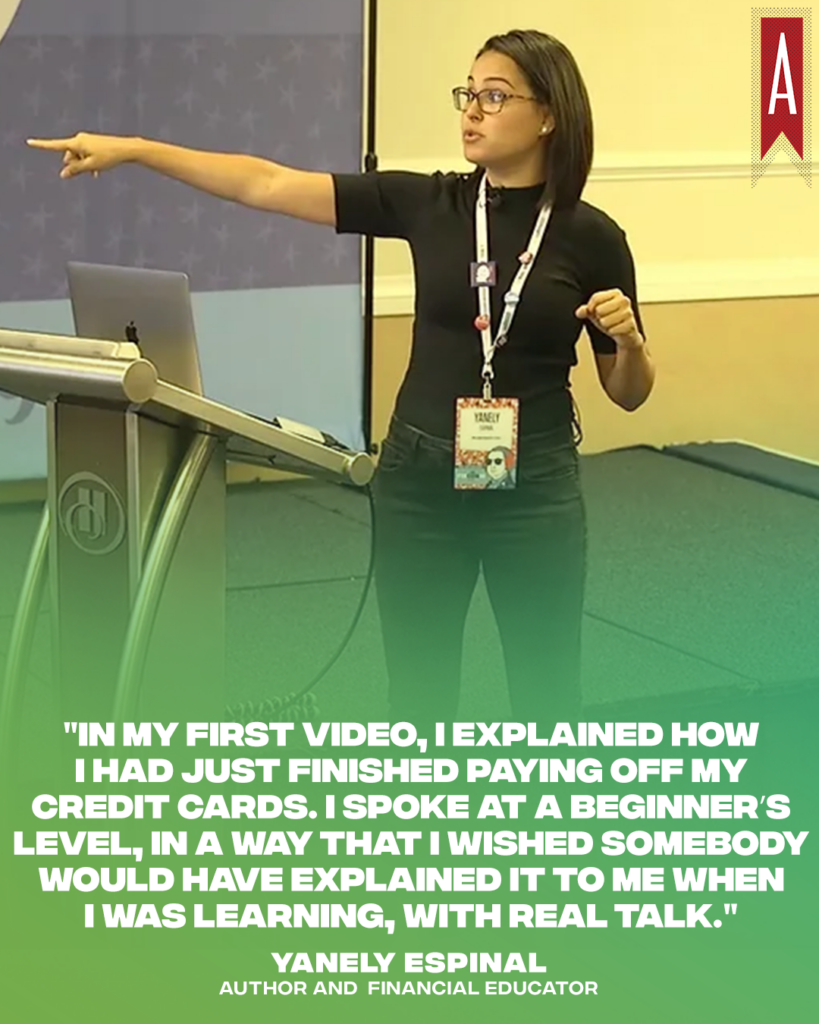
Her Agenda: How did your YouTube success and all your other efforts motivate you to write a book?
Yanely Espinal: Honestly, I didn’t want to write it, and I actually talked about this in the book. I’m not a natural writer. When I think about my writing, I feel like it’s very academic, because I’ve only ever written long-form for school. But my YouTube subscribers would say in the comments and DMs that I should write a book because I was giving them so much information. So, I started thinking about it, and I was like, ‘yeah, maybe I’ve been holding myself back.’ I kept telling myself that I wasn’t a writer, but I am a natural storyteller. When I was a kid, I actually won a lot of storytelling contests in the state of New York. As a teacher, I was constantly telling stories to hook my students into my lessons. So I told myself that I’m not going to see myself as a writer, I’m going to see myself as a storyteller— and it happens to be one that involves a lot of lessons about money. I think that’s naturally how I got to the point where I felt confident and comfortable to tackle a book. If you asked me to talk about my life or tell my story that doesn’t intimidate me, I could talk for hours.
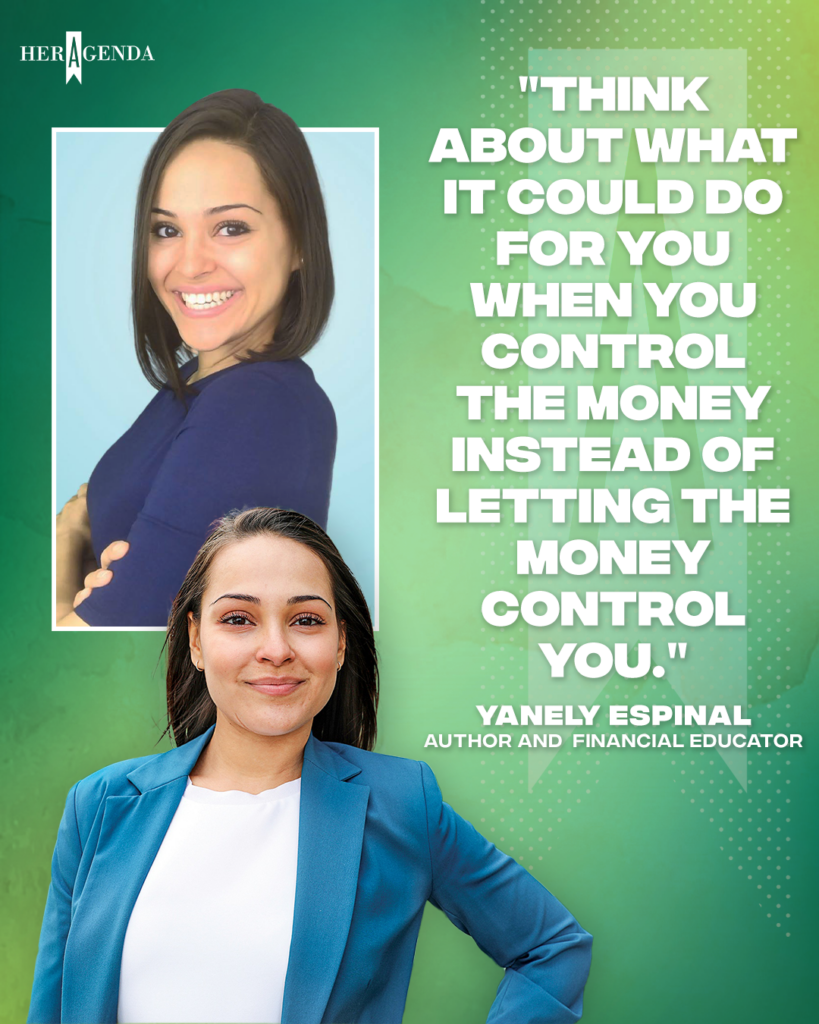
Her Agenda: A lot of people look at money through a scarcity mindset, or they’re scared to even think about money. How do you talk to these kinds of people in your book?
Yanely Espinal: Don’t think about the money itself, because that is going to be scary. Crunching the numbers and seeing how much money you owe is the scary part. But if you look past it, what is it that money represents for you in your life? Some people will say, ‘the money is going to allow me to get access to medical care,’ or ‘the money is going to allow me to retire my dad and provide a better life for my daughters. It’s going to allow me to open a business that I’ve been dreaming of forever.’ For every one of us, money represents something different. We don’t need to all agree about what money is– money is a tool you can use one way or another.
What we really want to pay attention to is the meaning of money. What is it that the money is allowing you to access, and how does that make you feel? Helping my parents retire makes me feel good. The money itself is just a vehicle for you to achieve those goals and dreams. So once you start to look past the money and see what the money can do for you, it’s going to make you braver and more willing to face the money because now you aren’t thinking just about money. Think about what it could do for you when you control the money instead of letting the money control you.
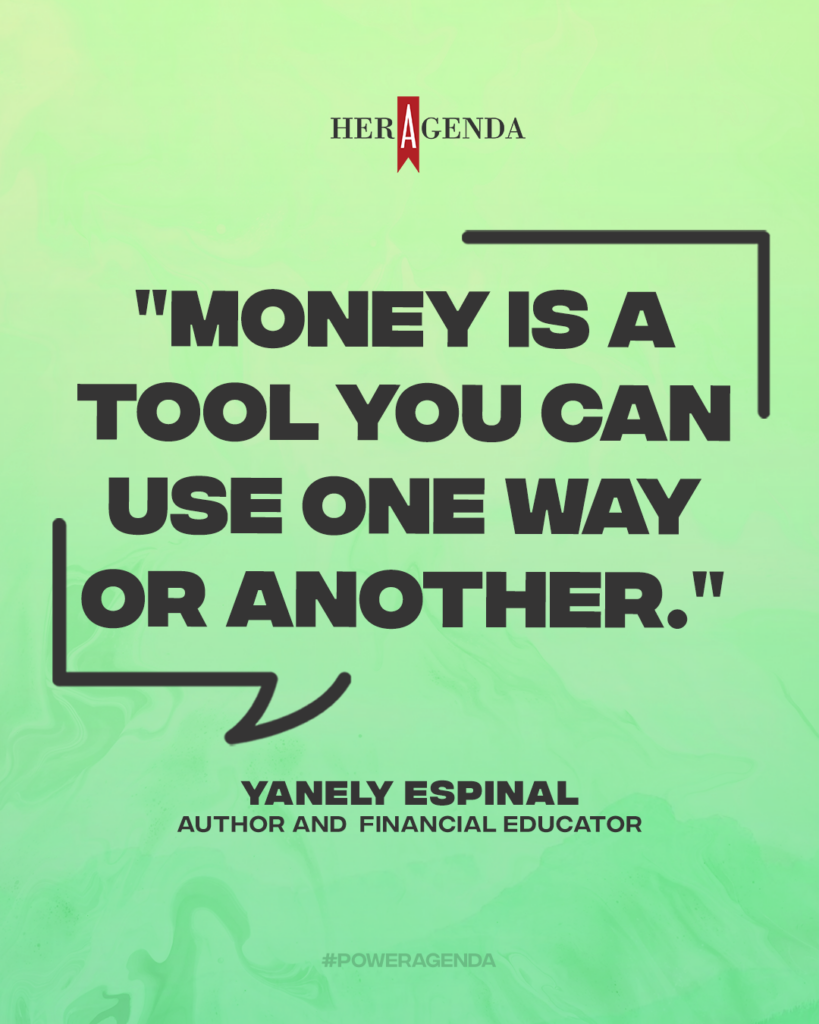
Her Agenda: Is there anything else you would like to add?
Yanely Espinal: I’m actually really proud of the work that I’m doing. My goal is not just to make so much money– ultimately, my goal is really beyond me and my life. I work with a nonprofit organization called NGPF, which stands for Next Gen Personal Finance. They work in all 50 states to give teachers a free curriculum to teach banking, budgeting, investing, taxes, insurance, paying for college, and your money mindset.
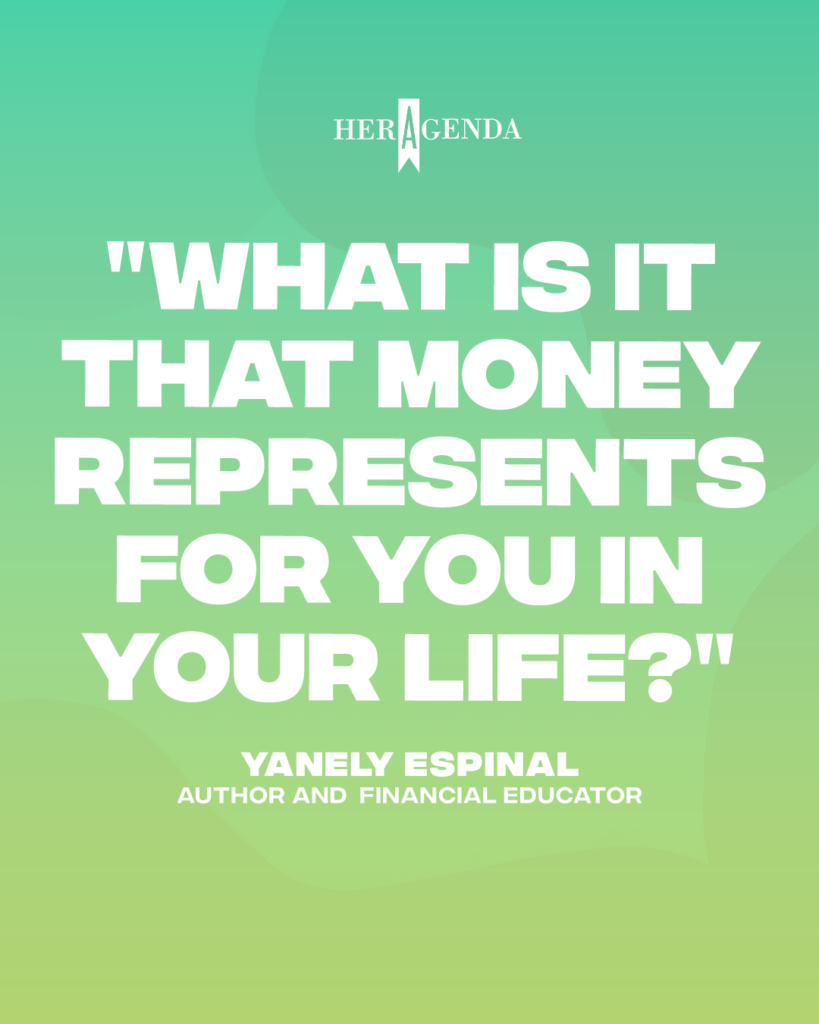
They also share research about the importance of financial literacy education and motivate states to change their laws to require a financial literacy class for high school graduation. It feels like I’ve come full circle in my work because when I started out, I was thinking to myself how I never got a class about money in school. But if I had, I would have studied money the same way we studied biology in high school. And now, we’ve gone from five states to require financial literacy in their classes to 22 states. That’s more than four times the amount of growth from 2018 to 2023. That’s what makes me the proudest because I got to talk in my book about how I was involved in championing these bills and getting the laws to change because you could help a million individual people. It’s a game-changer in terms of systemic change.
[Editor’s note: This interview has been edited for length and clarity.]

